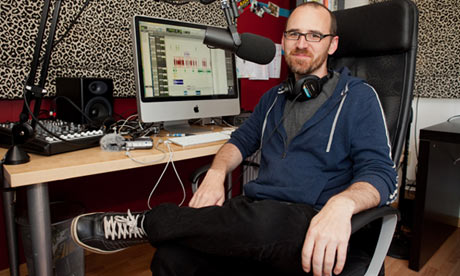
99% Invisible (99percentinvisible.org)
I am all excited because this week I can tell you about a fantastic podcast that I've recently discovered, which is my new top-of-the-toppermost favourite listening thing. Have you heard 99% Invisible? It's just great.
99% Invisible, is, like This American Life, a proper radio show that goes out regularly on a local public radio station in the US, in this case on KALW in San Francisco. But it's also a free podcast, to which you can subscribe to via iTunes, or its website, which offers you little visual snippets to accompany each show.
The conceit is that it's about design, architecture "and the 99% invisible activity that shapes our world", but, actually, it's about human experience, often based in untold or forgotten history. So episode 76, The Modern Moloch, demonstrates that America's fabled "love affair with the automobile" was actually a PR construct and that for the first 25 years of the last century, cars were regarded by most as a lethal menace. Children were not used to fast vehicles being around and carried on playing in the street as though they didn't exist.
As a result, children were killed in their thousands; and each child's death was treated as though he or she had died in war. Their funerals drew crowds of mourners, cities built monuments to their memories, their mothers wore a special white star to honour their loss. Newspaper editorials raged against the marauding menace; cartoons depicted cars as killer gods. The motor industry fought back, by mocking "jaywalkers" as idiot buffoons and by promoting the idea that cars don't kill people, people do. Remind you of anything?
The most recent 99% episode is called Symphony of Sirens, and tells the tale of Russian artist Arseny Avraamov's Symphony of Sirens, which took place in Moscow in 1923. There are shows about slot machines, sign painting, skate parks. What's great about them is not just the subject matter, which is thoroughly absorbing, but the way the programmes are made. Presenter/producer Roman Mars has a warm, inclusive tone with interviewees and listeners, and the sound effects are well chosen, dramatic and slightly funny. This gives the podcasts the feel of a beautifully told story, rather than a "check my research" documentary. Also, the assumption is that the audience understands what's going on; so there are none of those tedious "coming up" teaser clips at the beginning of the show, nor the "I'm so-and-so, and in this programme I'm going to explore the question of blah blah" that all radio documentaries on the BBC are bound to include, on pain of producer and presenter death. Please, BBC, can we just get rid of them? Listen to 99%, or This American Life – or even Answer Me This!, (Helen Zaltzman of AMT recommended 99% to me) – and, you know, relax.
99% led me to RadioLab, which I've listened to before. It's clever fun, RadioLab, but the inter-presenter "hey, guys, you know me-ee!" chumminess gets on my nerves. But still, RadioLab is embarrassingly far ahead of anything regularly produced by our own public radio network. Did you know that, this year, the Sony awards got rid of its best internet programme award? Wind your lower jaw back up and say a prayer for British radio.

